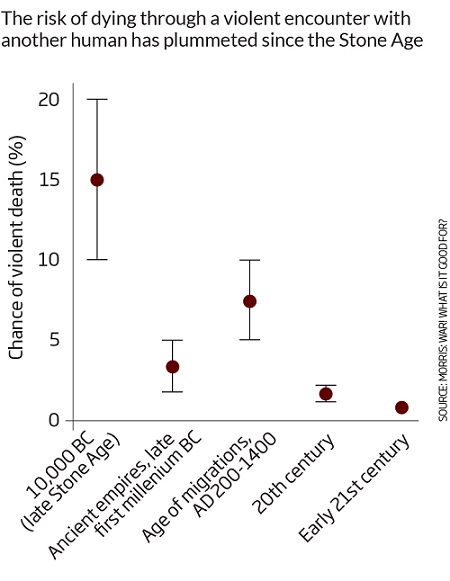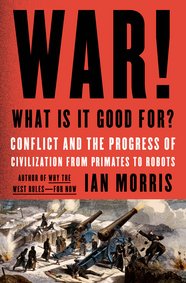Eventually, that is. Unless we are killed, starved, raped, maimed, robbed or otherwise damaged in the process.
The proposition is simple:
War has been good for something: it has produced bigger societies, ruled by stronger governments, which have imposed peace and created the preconditions for prosperity.
Through war humanity is now safer and richer than ever before.
That’s the central thesis of historian Ian Morris’s book War! What Is It Good For? according to his article in the New Scientist (paywalled). (There is a similar article in the Chicago Tribune.)
Mind you he says “war is probably the worst way imaginable to create larger, more peaceful societies” but “it is pretty much the only way humans have found.”
From our position in the 21st century we see the 20th century as the most violent ever. Indeed, Morris says, we killed between 100 and 200 million of our own kind. Yet 10 billion lives were lived in that century, meaning the the death rate from violence was only 2 to 3 per cent.
By contrast in the Stone Age an estimated 10 to 20% of people died at the hands of another human. Comparable was the experience of the Serbs in WW1 where one in six perished.
In traditional societies:
Most of the killing was on a small scale, in homicides, vendettas and raids, but because populations were also small, the steady drip of low-level killing took an appalling toll.
This graphic shows ‘progress’ over the millennia:

Since 2000, the United Nations tells us, the risk of violent death has fallen still further, to 0.7 per cent.
Ten thousand years ago people lived on average 30 years and got by on the equivalent of less than $2 per day. Now the respective global averages are 67 years and $25 per day.
Morris says that virtually every species is programmed for violence. Fukuyama in his The Origin of Political Order quotes archaeologist Stephen LeBlanc:
Much of noncomplex society human warfare is similar to chimpanzee attacks. Massacres among humans at the social level are, in fact, rare occurrences, and victory by attrition is a viable strategy, as are buffer zones, surprise raids, taking captive females into the group, and mutilation of victims. The chimp and human behaviors are almost completely parallel.
Humans, however, with more lethal weapons were more deadly.
Jared Diamond in his book The World Until Yesterday has several chapters on war, but I’d like to quote a study he cites of homicide over the period 1920-1969 amongst the !Kung people in the Kalahari. The !Kung are recognised as peaceable people.
The study identified 22 killing over 49 years, or less than one every two years. It’s just that the population under study was only around 1500. That makes the homicide rate triple that of the United States and 10 to 30 times that of rates for Canada, Britain, France and Germany.
Killing was a norm and in that society.
The graphic shows an increase in violent deaths during what Morris terms the ‘age of migrations’, from AD200-1400. This was a time when Fukuyama would say social/political organisation in Europe had moved beyond the tribal, but had not yet achieved the form of the modern state. It was not a time when the state competently and fairly extracted taxes from all and applied them consistently for the general good. Tom Holland in his book Millennium describes how rulers saw it as their mission to Christianise the heathen but they did this by plundering and bringing home the loot. There was a zero sum attitude to economic growth. You accrued great wealth by taking it from other people.
Castles became popular in the tenth century, not to guard against external threat, but as a base to plunder and extract tribute from the surrounding countryside. Knights were the primary agents, mailed thugs and at that time, Holland says, by definition in a state of sin.
People became increasingly competent at conducting war, with a map that was extremely fluid. During the Thirty Years War German territories lost about a third of their population. In Brandenburg, the seed state of Prussia, it was a half. Yet between times there were periods of peace and prosperity, with an increasing idea that the competent state was there to serve the welfare of the people.
Morris says we used war and killing, because for humans it was the only way. What he doesn’t appear to emphasise is the other side of human nature, the co-operative, altruistic side, which on his evidence is gradually triumphing.
By some counts we have only had the modern state in its full form since WW1.
I could be doing Morris an injustice, as I have not read the book. In The Wall Street Journal Felipe Fernadez-Armesto has some reservations.

